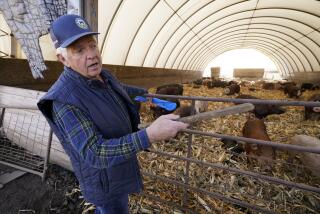Yogurt Container Redesigned, but Animal Advocates Turn Up Their Noses
- Share via
First there was dolphin-safe. Now, courtesy of General Mills, we have skunk-safe.
It may not carry the same emotional cachet of the dolphins imperiled by tuna nets, but foraging skunks who poke their noses into discarded Yoplait yogurt containers have been dying at a small but noticeable rate for years, animal rights activists say.
In an effort to prevent more deaths, which activists estimate to be about 100 nationwide each year, the maker of the No. 2 yogurt brand has modified the tapered Yoplait container to make it animal-safe--well, at least animal-safer--and added a warning label to the bottom: “Protect wildlife; crush before disposal.”
“The redesign is somewhat friendlier to small animals,” said Jack Sheehan, a spokesman for Minneapolis-based General Mills, but it is up to consumers to crush the containers before throwing them away.
“The [design] changes were already in progress,” even before General Mills was contacted by the Animal Protection Institute, a Sacramento-based group concerned about the skunks’ predicament, he said. Still, Sheehan said the company wanted consumers to know it was concerned. “A dozen dead skunks is a dozen dead skunks too many,” he said.
But the animal rights activists believe the changes stink.
The bushy-tailed, black-and-white creatures are still at risk because the modification to the yogurt containers is too slight, said Camilla Fox, spokeswoman for the Animal Protection Institute. The container’s rim curves inward and traps the animal when it sticks its nose and head inside. (General Mills said it curved back the top lip a few millimeters.)
“We are not asking them to change the product, just change the top,” Fox said, adding that when the container was created 20 years ago, researchers tested its safety on squirrels, not skunks, and concluded that the opening was animal-safe. She said her group criticized General Mills for testing the new container on a simulated model of a skunk-size animal.
“You can’t test this on a real animal because that would be cruel,” Sheehan responded. Realistically, he said, “very few people study skunks.”
Sheehan said the Animal Protection Institute had urged the company to make the containers bigger. But he said that idea was impractical. “A larger container would just trap larger animals.”
The company had been considering a redesign of the Yoplait packaging for 18 months, but when reports surfaced about nine months ago that skunks and other small feral animals were getting stuck, the plan was speeded up, Sheehan said.
Millions of the modified containers, made from a polypropylene material that crushes easily, have been shipped to California supermarkets from General Mills’ Covington, Calif., plant, Sheehan said. More will be transferred nationwide soon.
More to Read
Inside the business of entertainment
The Wide Shot brings you news, analysis and insights on everything from streaming wars to production — and what it all means for the future.
You may occasionally receive promotional content from the Los Angeles Times.








